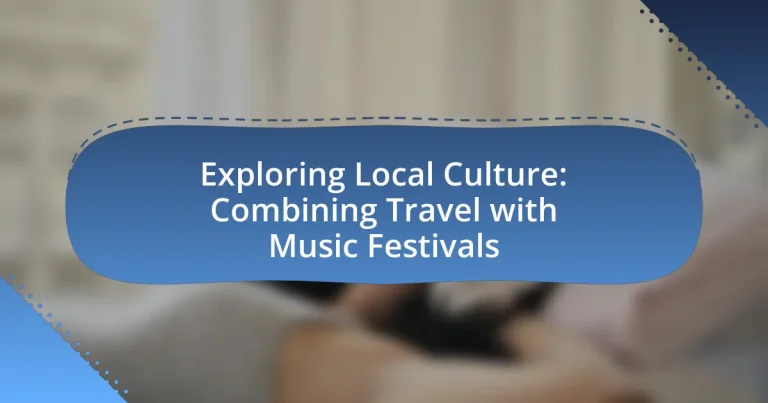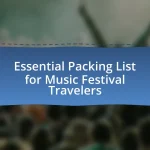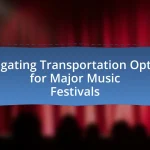The article focuses on the exploration of local culture through music festivals, highlighting how these events serve as platforms for showcasing regional traditions, musical styles, and community values. It discusses the cultural elements typically featured at festivals, such as local cuisine, art, and performances, and emphasizes the significance of local traditions in shaping the festival experience. Additionally, the article examines the benefits of combining travel with music festivals, detailing how attendees can gain immersive cultural experiences and enhance their understanding of diverse communities. It also provides practical tips for travelers on effectively planning their festival attendance and immersing themselves in local culture.
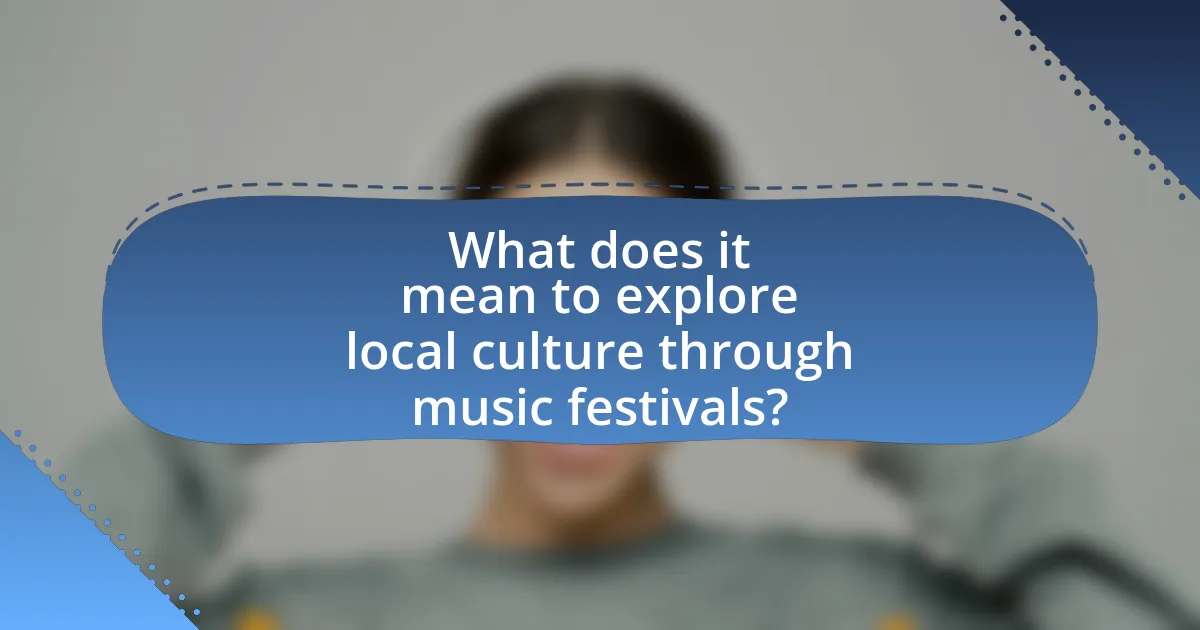
What does it mean to explore local culture through music festivals?
Exploring local culture through music festivals means engaging with and experiencing the unique traditions, values, and social practices of a community. Music festivals often showcase local artists, traditional music styles, and cultural expressions that reflect the heritage of the region. For example, festivals like the New Orleans Jazz & Heritage Festival highlight the city’s rich musical history and cultural diversity, allowing attendees to immerse themselves in the local way of life. This engagement fosters a deeper understanding of the community’s identity and promotes cultural exchange among participants.
How do music festivals reflect the culture of a region?
Music festivals reflect the culture of a region by showcasing local traditions, musical styles, and community values. These events often feature regional artists and genres that resonate with the local population, such as folk music, indigenous sounds, or contemporary styles unique to the area. For instance, the New Orleans Jazz & Heritage Festival highlights the city’s rich jazz history and cultural diversity, emphasizing the significance of music in local identity. Additionally, festivals often incorporate local cuisine, art, and customs, creating an immersive experience that celebrates the region’s heritage. This connection between music and culture is evident in the way festivals serve as platforms for cultural exchange, fostering community pride and attracting tourism that further enriches the local economy.
What cultural elements are typically showcased at music festivals?
Music festivals typically showcase a variety of cultural elements, including local music genres, traditional dance forms, regional cuisine, and art installations. These elements reflect the heritage and identity of the host community, allowing attendees to experience the local culture firsthand. For instance, festivals like Coachella in California feature diverse musical acts that represent various cultural backgrounds, while events like the New Orleans Jazz & Heritage Festival highlight the city’s unique jazz traditions and culinary offerings. Such festivals often include workshops and performances that educate attendees about local customs and practices, reinforcing the cultural significance of the event.
How do local traditions influence the music festival experience?
Local traditions significantly shape the music festival experience by infusing cultural elements that enhance the atmosphere and engagement of attendees. For instance, festivals often incorporate traditional music styles, dance forms, and local culinary offerings, which create a unique environment reflective of the region’s heritage. A study on cultural festivals indicates that local customs can increase participant satisfaction and foster a sense of community, as seen in events like the New Orleans Jazz & Heritage Festival, where local jazz and blues traditions are celebrated, attracting both locals and tourists. This integration of local traditions not only enriches the festival experience but also promotes cultural preservation and appreciation among diverse audiences.
Why is combining travel with music festivals beneficial?
Combining travel with music festivals is beneficial because it enhances cultural immersion and fosters social connections. Attending music festivals in different locations allows travelers to experience local traditions, cuisine, and art forms, which enriches their understanding of the culture. For instance, festivals like Coachella in the United States or Glastonbury in the UK attract diverse audiences and showcase regional music styles, providing attendees with a unique glimpse into the local lifestyle. Additionally, these events often promote community engagement, as they bring together people from various backgrounds, facilitating new friendships and shared experiences. This combination of travel and music festivals not only broadens personal horizons but also supports local economies through tourism.
What unique experiences can travelers gain from attending local music festivals?
Travelers can gain immersive cultural experiences by attending local music festivals, as these events showcase regional music styles, traditions, and community values. Engaging with local artists and musicians allows travelers to appreciate the unique sounds and rhythms that define a culture, fostering a deeper understanding of the local heritage. Additionally, festivals often feature traditional food, crafts, and social interactions, creating a holistic experience that connects visitors with the community. For instance, events like the New Orleans Jazz & Heritage Festival not only highlight jazz music but also celebrate the city’s culinary and artistic diversity, making it a rich cultural experience for attendees.
How does attending music festivals enhance cultural understanding?
Attending music festivals enhances cultural understanding by providing immersive experiences that showcase diverse musical traditions and cultural expressions. These festivals often feature artists from various backgrounds, allowing attendees to engage with different cultural narratives through performances, workshops, and interactions with local communities. For instance, festivals like Coachella in the United States and Glastonbury in the UK attract international artists, promoting cross-cultural exchange and appreciation. Research indicates that such events foster social cohesion and cultural empathy, as participants share in the collective experience of music, which transcends language barriers and promotes a deeper understanding of different lifestyles and values.
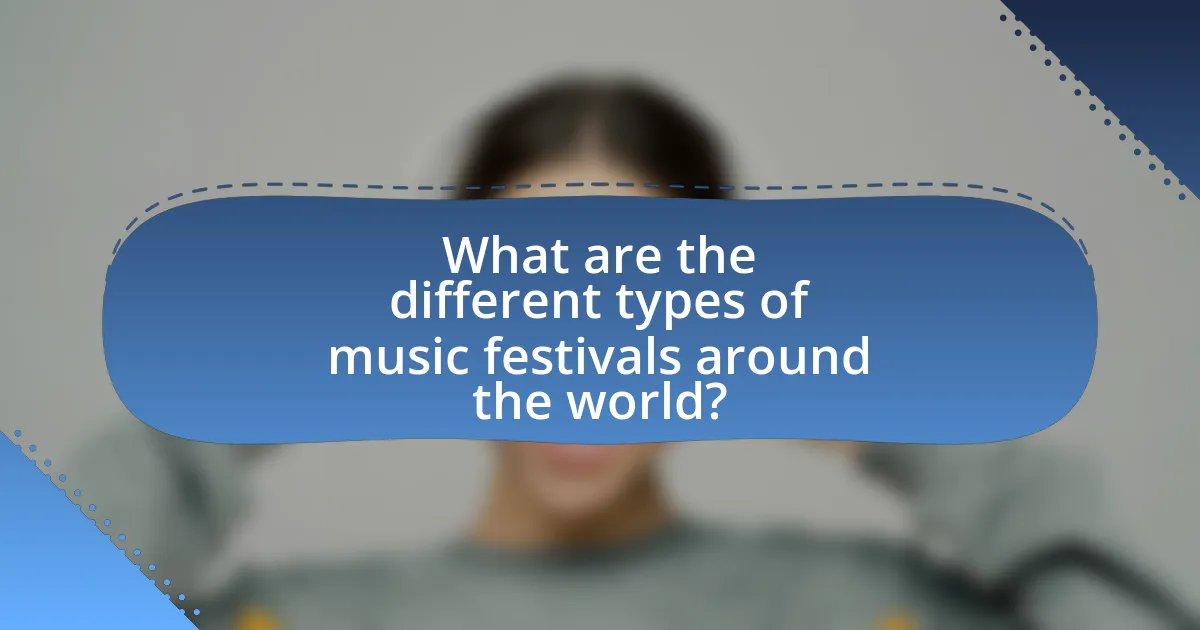
What are the different types of music festivals around the world?
There are several types of music festivals around the world, including genre-specific festivals, cultural festivals, and multi-genre festivals. Genre-specific festivals focus on a particular style of music, such as rock, jazz, electronic, or country, attracting fans of that genre. Cultural festivals celebrate the music and traditions of specific regions or communities, often featuring local artists and traditional performances. Multi-genre festivals showcase a diverse range of musical styles, appealing to a broader audience and often including various activities beyond music. Examples include Coachella in the United States, Glastonbury in the UK, and Tomorrowland in Belgium, each representing different types of music festivals.
How do genres of music shape the festival experience?
Genres of music significantly shape the festival experience by influencing the atmosphere, audience demographics, and cultural expressions present at the event. For instance, electronic dance music festivals often create a vibrant, energetic environment characterized by light shows and communal dancing, attracting a younger crowd seeking social interaction and escapism. In contrast, folk music festivals typically foster a more intimate and reflective atmosphere, appealing to audiences interested in storytelling and cultural heritage.
Research indicates that the genre of music can dictate not only the types of performances and activities offered but also the overall vibe and engagement levels of attendees. For example, a study published in the Journal of Cultural Economics found that festivals featuring diverse musical genres tend to attract a wider audience, enhancing cultural exchange and local tourism. Thus, the genre of music plays a crucial role in shaping the festival experience by determining the emotional and social dynamics of the event.
What are some popular genres represented at music festivals?
Popular genres represented at music festivals include rock, electronic dance music (EDM), hip-hop, pop, and country. These genres attract diverse audiences and are commonly featured at major festivals worldwide, such as Coachella, Lollapalooza, and Glastonbury. For instance, the Coachella Valley Music and Arts Festival showcases a mix of rock, pop, and EDM artists, reflecting current trends and audience preferences. Similarly, the Bonnaroo Music and Arts Festival highlights a blend of rock, hip-hop, and country, catering to a wide range of musical tastes.
How do genre-specific festivals cater to local culture?
Genre-specific festivals cater to local culture by showcasing regional music, art, and traditions that resonate with the community’s identity. These festivals often feature local artists and performers, creating a platform for them to share their work and connect with audiences who appreciate their cultural background. For example, the New Orleans Jazz & Heritage Festival highlights local jazz musicians and celebrates the city’s unique cultural heritage, drawing on its rich history of African, French, and Spanish influences. This not only promotes local talent but also fosters community pride and engagement, as residents participate in and support events that reflect their cultural values and history.
What are some notable music festivals that highlight local culture?
Notable music festivals that highlight local culture include the New Orleans Jazz & Heritage Festival, which celebrates the music and culture of New Orleans through local artists and cuisine, and the Edinburgh Festival Fringe, showcasing a diverse range of performances that reflect Scottish culture. Additionally, the Carnaval de Bahia in Brazil emphasizes Afro-Brazilian music and traditions, while the Gnaoua World Music Festival in Morocco highlights the country’s rich musical heritage. Each of these festivals serves as a platform for local artists and cultural expressions, reinforcing their significance in the community.
Which festivals are recognized for their cultural significance?
Festivals recognized for their cultural significance include Diwali, Carnival, and the Chinese New Year. Diwali, celebrated by millions in India and around the world, symbolizes the victory of light over darkness and is marked by various rituals and festivities. Carnival, particularly in Brazil, showcases vibrant parades and music, reflecting the country’s diverse cultural heritage. The Chinese New Year, celebrated globally, emphasizes family reunions and traditional customs, marking the start of the lunar new year with various cultural practices. These festivals are integral to their respective cultures, serving as a means of preserving traditions and fostering community.
How do these festivals promote local artists and traditions?
Festivals promote local artists and traditions by providing a platform for them to showcase their work and cultural heritage. These events often feature performances, exhibitions, and workshops that highlight the unique artistic expressions and customs of the local community. For instance, festivals may include traditional music, dance, and crafts that reflect the region’s history and identity, thereby fostering a sense of pride and continuity among residents. Additionally, festivals attract visitors, which can lead to increased visibility and economic opportunities for local artists, as seen in events like the New Orleans Jazz & Heritage Festival, where local musicians gain exposure to larger audiences.
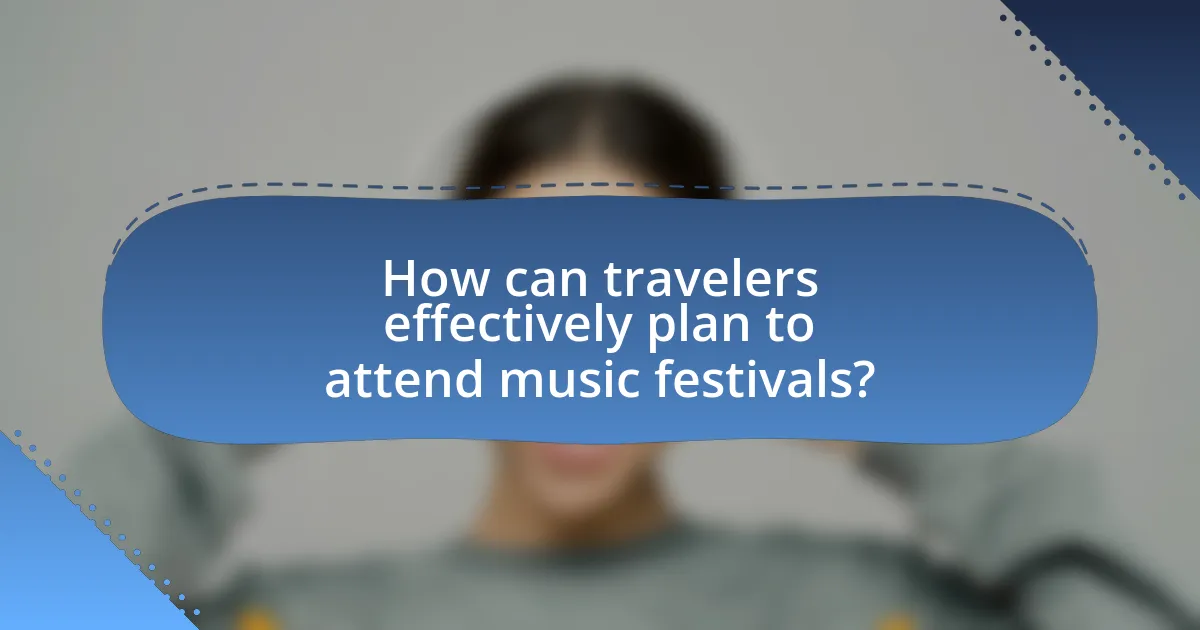
How can travelers effectively plan to attend music festivals?
Travelers can effectively plan to attend music festivals by researching festival dates, ticket availability, and accommodation options in advance. This proactive approach allows travelers to secure their desired tickets and lodging, as many popular festivals sell out quickly. For instance, major festivals like Coachella and Glastonbury often release tickets months in advance, necessitating early planning. Additionally, travelers should consider transportation logistics, such as flights or local transit, to ensure timely arrival. Understanding the festival’s location and local culture can enhance the experience, as many festivals feature regional food, art, and traditions. By combining these elements, travelers can create a well-rounded plan that maximizes their enjoyment and immersion in the local culture surrounding the music festival.
What are the best strategies for finding local music festivals?
The best strategies for finding local music festivals include utilizing online platforms, engaging with local communities, and following social media channels. Online platforms such as Eventbrite and Facebook Events provide comprehensive listings of upcoming festivals based on location and genre. Engaging with local communities through forums or community boards can yield insider information about lesser-known festivals. Additionally, following social media channels of local venues and artists often reveals announcements and updates about music festivals, as many events promote themselves through these platforms. These strategies are effective as they leverage both digital resources and community engagement to uncover a wide range of music festivals.
How can travelers research festivals in advance?
Travelers can research festivals in advance by utilizing online resources, social media platforms, and local tourism websites. These platforms provide comprehensive information about festival dates, locations, and activities. For instance, websites like Eventbrite and Facebook Events allow users to search for festivals by location and date, offering insights into ticket availability and event details. Additionally, travel blogs and forums, such as Lonely Planet and TripAdvisor, often feature firsthand accounts and recommendations from previous attendees, enhancing the research process. This method of gathering information ensures that travelers can plan their itineraries effectively and engage with local culture through music festivals.
What resources are available for festival schedules and lineups?
Festival schedules and lineups can be accessed through various resources, including official festival websites, social media platforms, and dedicated event apps. Official festival websites typically provide the most accurate and up-to-date information regarding schedules and artist lineups, often including ticket purchasing options. Social media platforms, such as Facebook and Instagram, allow festivals to share real-time updates and engage with attendees. Additionally, event apps like Songkick and Bandsintown aggregate information from multiple festivals, offering personalized notifications about lineups and schedule changes. These resources ensure that festival-goers have reliable access to essential information for planning their attendance.
What tips can enhance the festival experience for travelers?
To enhance the festival experience for travelers, it is essential to immerse oneself in the local culture by participating in pre-festival activities, such as workshops or community events. Engaging with locals provides insights into traditions and customs, enriching the overall experience. Additionally, planning accommodations close to the festival venue can minimize travel time and maximize enjoyment. According to a study by the University of California, travelers who stay within walking distance of events report higher satisfaction levels due to convenience and accessibility. Lastly, trying local cuisine at food stalls or nearby restaurants allows travelers to experience authentic flavors, further connecting them to the culture surrounding the festival.
How can travelers immerse themselves in the local culture during festivals?
Travelers can immerse themselves in local culture during festivals by actively participating in traditional activities, engaging with local communities, and experiencing authentic cuisine. For instance, joining in local dances or rituals allows travelers to connect with cultural expressions firsthand. Engaging with local artisans and vendors provides insight into regional crafts and practices, fostering a deeper understanding of the culture. Additionally, sampling traditional foods at festival stalls offers a taste of local flavors and culinary heritage, enhancing the overall cultural experience. These activities not only enrich the travel experience but also promote cultural exchange and appreciation.
What should travelers consider when packing for a music festival?
Travelers should consider the weather, comfort, and festival regulations when packing for a music festival. Weather conditions can vary significantly, so packing appropriate clothing, such as rain gear or sun protection, is essential. Comfort is crucial, as attendees will be on their feet for long periods; therefore, sturdy footwear and lightweight clothing are recommended. Additionally, many festivals have specific regulations regarding items like bags, food, and alcohol, so reviewing these guidelines ensures compliance and enhances the overall experience.
